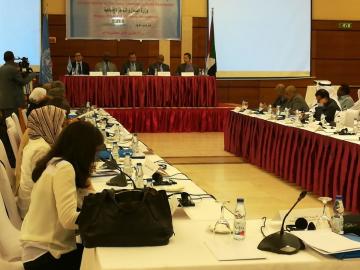
A crowd of Arab ministers and experts have agreed on the importance of ESCWA continuing to increase its technical support to Member States to implement the social dimension of the 2030 Agenda based on the approaches developed to serve the complementary nature of the Agenda. It was also agreed to implement training workshops for Member States on the use of the handbook prepared by the Secretariat of ESCWA to integrate the principles of social justice into policy-making, including social protection policies. These recommendations were taken by the participants in the 11th Session of the ESCWA Committee on Social Development hosted by the Republic of Sudan from 17 to 18 October 2017 at the Khartoum Corinthia Hotel.
Participants stressed the importance of encouraging and developing private sector efforts to support programs of persons with disabilities within the framework of Corporate Social Responsibility (CSR) and called for raising awareness at the national level of the concepts of intergenerational equity on public policies, their dimensions and effects.
Representatives of concerned ministries in Member States attended the Session’s meetings in addition to relevant regional and international organizations who attended the Session as observers.
The Committee’s deliberations started with a review of actions taken by the ESCWA Social Development Division and of progress achieved in implementing the programmed activities in the field of Social Development as well as recommendations issued by the Committee at its previous Session. In particular, the ESCWA secretariat briefed the Committee on actions taken to form an intersessional group of experts on persons with disabilities; the results of the questionnaire on the programs and activities of the Social Development Division; the implementation of the Tunis Declaration on Social Justice which was issued by the ESCWA 40th ministerial Session; and technical assistance for the implementation of the Sustainable Development Goals (SDGs).
The Session also tackled three salient issues in the field of social development namely the New Urban Agenda which was endorsed by the General Assembly at its seventy-first Session in December 2016, and the follow-up by ESCWA on its implementation from a social development angle; age structural transitions and sustainable development; and intergenerational justice.
The opening ceremony of the Session had seen statements by ESCWA delivered by Director of the Social Development Division (SDD), Frederico Neto, who said, “this Session comes at a time when the Arab region continues to witness many development transitions, coupled with significant social, economic and political challenges to the achievement of growth, development, and human and societal prosperity. At the same time, the world at large is undergoing a number of transitions which call for concerted global and regional efforts to promote a more just, secure, sustainable and inclusive development.”
The Session also saw statements by Sudan’s Deputy Minister of Social Security and Development Ali Mohamed Khair representing Minister of Social Security and Development Mashaer Al Amine Al Dawlab; Sudan’s Minister of Trade Hatem al-Sir Ali and Director of Planning and Follow-up in the Ministry of Labor and Social Affairs in Iraq Hussein Ali Abdel Hassan al-Saidi since Iraq had chaired the 10th Session of the ESCWA Committee on Social Development.
For his part, Khair called for further cooperation to maximize the benefits of the work programs for the upcoming Session and for giving preferential treatment to countries facing difficulties in implementing common programs. He also called for more efforts and technical support from some Member States to provide more development and social information and then renew the information of these countries, especially within the studies issued by ESCWA, in addition to increasing the volume of these publications and studies on these countries.
Al-Sir Ali commended the existing cooperation between ESCWA and Sudan and said, “during the implementation of the ESCWA work program for the biennium 2016-2017, in enforcement of the recommendations of the Committee on Social Development at its 10th Session, those activities focused on national capacity-building, offering advisory services in the field of social development, preparing studies and guides and developing sensitive regional guidelines in the areas of Sustainable Development, Social Justice, Disability and Population, in addition to working in cooperation with Member States to find the best ways to develop integrated and responsive social policies.”
Al-Saidi noted that “countries in our Arab and Islamic region face development challenges and popular aspirations for more rights and freedoms, and social justice in a comprehensive and multidimensional perspective. "
The Committee on Social Development was established pursuant to the ESCWA resolution 198 (XVII) of 31 May 1994, which was endorsed by the United Nations Economic and Social Council in its resolution 1994/27 of 26 July 1994. The objective was to enhance regional cooperation in planning and implementing the ESCWA program of work in the field of Social Development, through the effective participation of relevant parties in ESCWA Member States. The Committee held its first Session in Amman in 1997, its second, third, fourth and fifth Sessions in Beirut in 1999, 2001, 2002 and 2005 respectively, its sixth Session in Amman in 2007, its seventh and eighth Sessions in Beirut in 2009 and 2011 respectively, its ninth Session in Amman in 2013 and its tenth Session in Rabat in 2015.
Read more:
ESCWA Media Center: https://www.unescwa.org/news
ESCWA in the media: https://www.unescwa.org/ar/press-review





